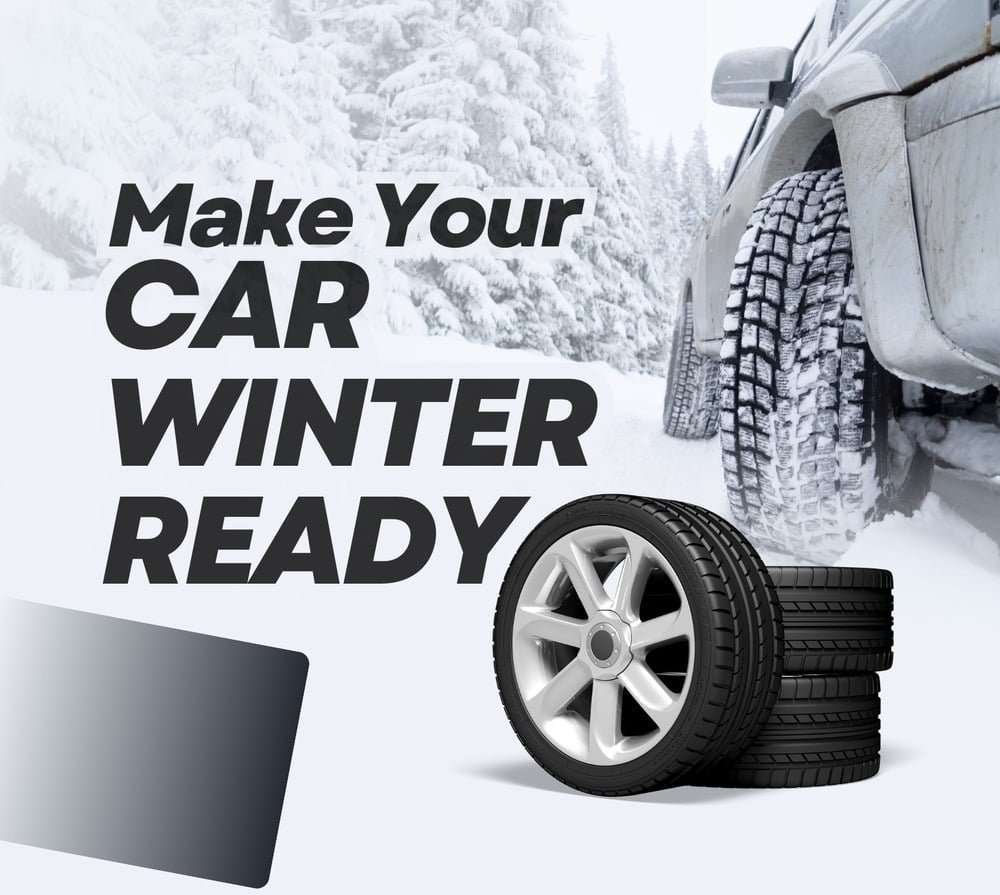Winter can be tough on your car, but with a bit of preparation, you can ensure that your vehicle remains in top shape throughout the cold months. Here are 10 useful tips for getting your car ready for winter
Image Via Pexel.com
Check your Car battery
Cold weather can reduce your battery’s capacity, so it’s essential to have it tested and replaced if necessary. Clean any corrosion from the terminals and ensure a secure connection. If your battery is older, consider replacing it to avoid unpleasant surprises on a chilly morning.
Winter Tire Care: Expert Advice
Your car’s tires are the only point of contact with the road, so they need special attention in winter. Make sure your tires have adequate tread depth and are properly inflated. Well-maintained tires provide better traction and control on icy roads. Consider switching to winter tires if you live in an area with heavy snowfall.
Check Winter Car Fluids
Ensure that your antifreeze is at the correct level and mixture. This will prevent your engine from freezing and potentially causing costly damage.
Pro TIP: Consider using winter-grade oil for added protection in colder temperatures.
Inspect Car Wipers and Washer Fluids
A clean windshield is essential for safe winter driving. Replace worn-out wiper blades and top up your washer fluid with a winter formula that won’t freeze in cold temperatures. Good visibility is essential for navigating through rain, snow, and sleet.
Test Car Heater and Defroster: Car Heating System Tips
You don’t want to freeze during your winter drives. Make sure your heater and defroster are working properly to keep you warm and maintain good visibility. If you notice any issues, get them fixed promptly. A warm and comfortable car makes winter driving more enjoyable.
Check Front and Back lights
Clean your car headlights and taillights, and ensure that all bulbs are in working order. Winter days are shorter, and visibility is crucial.
Inspect Your Car Brakes
Your brakes are your car’s most critical safety feature. In icy or snowy conditions, they play an even more significant role in preventing accidents. Have your brakes inspected by a professional to ensure they’re in excellent working condition. Don’t hesitate to replace worn brake pads or damaged components.
Keep Gas Tank Full
A full tank helps prevent moisture from forming in the fuel system and provides extra weight for better traction.Cold weather can reduce fuel efficiency.Choosing the correct fuel is crucial for your engine’s performance in cold weather.
Prepare an Emergency Kit
Winter weather can be unpredictable, and emergencies can happen. Prepare an emergency kit for your car. Include items like blankets, a flashlight, non-perishable snacks, and a first-aid kit. Being prepared can make a significant difference in case of an unexpected situation. You never know when you might get stranded.
Keep up with Regular Maintenance
Follow your car’s recommended maintenance schedule and address any issues promptly. A well-maintained vehicle is more likely to handle winter conditions without problems.
By following these ten tips, you’ll be well on your way to ensuring your car is ready for the challenges of winter. Remember, proper preparation not only keeps you safe but also extends the life of your vehicle. Stay safe on the roads and enjoy a worry-free winter driving experience.
Stay Safe!! Happy Winters
Frequently Asked Questions (FAQs)
A. What is the ideal time to start winterizing my car?
The ideal time to start winterizing your car is before the first snowfall. It’s best to prepare in advance to ensure your safety.
B. Do I really need winter tires, or can I use all-season tires?
While all-season tires are versatile, winter tires provide better traction in cold conditions. It’s recommended to use winter tires for improved safety.
C. How often should I replace my car’s antifreeze?
Antifreeze replacement intervals vary by the type of antifreeze used. Check your car’s owner’s manual for specific recommendations.
D. What should I include in my winter emergency kit?
Your winter emergency kit should include essentials like blankets, a flashlight, non-perishable food, and basic tools. Be prepared for emergencies on the road.
E. Can I use water instead of windshield washer fluid?
Using water instead of windshield washer fluid in winter can lead to freezing and damage. Stick to winter-grade washer fluid for better results.
F. How do I prevent my doors from freezing shut?
To prevent doors from freezing shut, use silicone spray on weather stripping and keep door locks lubricated with graphite or de-icing spray.
G. Are snow chains necessary if I have all-wheel drive?
While all-wheel drive can help with traction, snow chains are still beneficial in extreme winter conditions, providing added grip.
H. What should I do if I get stuck in snow or ice?
If you get stuck in snow or ice, remain calm, and try rocking your vehicle gently. Use sand, cat litter, or traction mats for added grip. If necessary, seek assistance.
I. How can I improve my vehicle’s fuel efficiency in winter?
Improving fuel efficiency in winter involves maintaining your car properly, inflating tires to the correct pressure, and avoiding excessive idling.
J. Is it essential to store my car in a garage during winter?
Storing your car in a garage during winter provides protection from the elements and can extend the life of your vehicle. It’s highly recommended if possible.
Also Read
